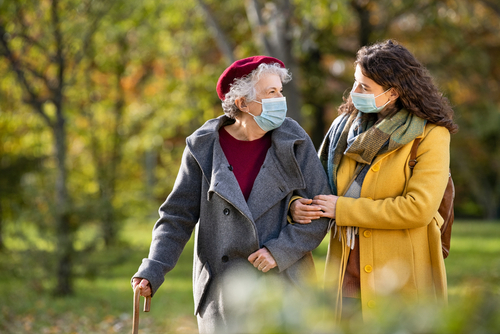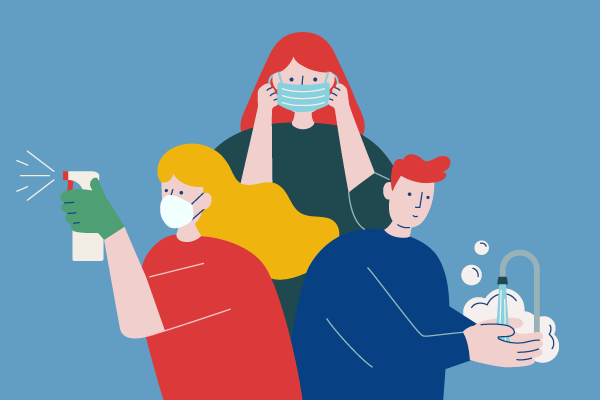When the cold weather sets in, it’s a good reminder that with it comes cold and flu season. No one likes to get struck down with illness at any time, but staying protected from cold and flu can be particularly important for the most vulnerable members of the community, such as our elderly.
Because these infections can be especially harmful to older individuals, aged care workers and aged care facilities need to take proactive measures to reduce the risk of infection and avoid its spread. After all, prevention is always better than cure, so let’s keep practical strategies and guidelines around infection control front of mind to ensure the elderly people in our care can stay safe, happy and well during the winter.

Practical strategies for aged care winter readiness
When it comes to preparing for the cold and flu season in aged care, implementing practical strategies is essential to ensure the health of elderly residents.
From infection control measures to environmental tweaks to maximise comfort, there are many practical strategies that aged carers can employ to be ready for winter.
The basics of infection control in aged care
First things first — let’s not let basic hygiene standards slip. These ones might seem obvious, but it’s always good to be reminded and ensure you have a system in place that makes sure these simple infection management habits are maintained:
Regular hand-washing
Remind those in your care (and your fellow aged care workers) on the importance of frequent handwashing with soap and water for at least 20 seconds. Hand sanitisers can be provided in common areas for added convenience.
Respiratory etiquette
Encourage everyone to cover their mouth and nose with a tissue or their elbow when coughing or sneezing to prevent the spread of germs. Dispose of used tissues properly and immediately.
Vaccination
Promote the importance of influenza vaccination for both residents and staff members in aged care. Covid vaccinations are important too and all regular boosters should be offered to keep everyone safe.
The role of aged care workers in protecting the elderly
Aged care workers play a crucial role in keeping those in their care protected from infection and illness, as well as comfortable during the colder months.
Make sure you’re ticking these boxes over winter to reduce the spread of illness, whether you’re working in home care or an aged care facility.
Remember your infection control training
Infection control measures, including proper hand hygiene, personal protective equipment (PPE) usage as needed, thorough cleaning protocols and more are key to ensuring the health of those around you.
Symptom awareness
Keep an eye out for common flu symptoms in yourself, residents and visitors. These could include fever, cough, runny nose, sore throat and body aches. Prompt identification can mean timely intervention and prevent further spread.
Keep the environment comfortable
Creating a warm and comfortable space is a must, especially considering many elderly people can be more sensitive to the cold. Regularly monitor and adjust heating systems to provide a comfortable living environment. Offer extra blankets, appropriate clothing, warm food and drinks for a cosy winter.
Empower elderly people
Where possible, aged care recipients should be included in the strategies around protecting their own health. Empower them to take an active role in safeguarding themselves from cold and flu. Not only will this contribute to minimising illness, but it goes a long way toward building and maintaining self-esteem and overall wellbeing.
Communicating with visitors about infection prevention
Engaging family members and other visitors in maintaining a healthy environment for their elderly loved ones is also essential. Thankfully, simple communication can be an effective way to help them understand the importance of reducing the spread of cold and flu in aged care.
Email and text tips
Share regular updates on flu season guidelines, proper hygiene practices, vaccination recommendations and more with family. A friendly reminder that a sniffle for them could be quite harmful to someone in aged care can make all the difference for someone’s decision whether it’s appropriate to visit or if rescheduling is better.
Display posters upon entry
Noticeboards, doors and front desks are perfect for catching visitors’ eyes on the way in to visit. If someone is coughing on the way in, they just might think twice with a visual reminder there about the potential dangers of infection.
Creating a safe, healthy aged care environment
At Selmar, we understand the importance of comprehensive training for aged care workers. We specialise in training our learners to deliver the highest quality care for the aged care sector.
This includes understanding principles and practices around infection prevention and control. By equipping them with the knowledge and skills needed to handle cold and flu season challenges, we can create a safer and healthier environment for elderly residents.



